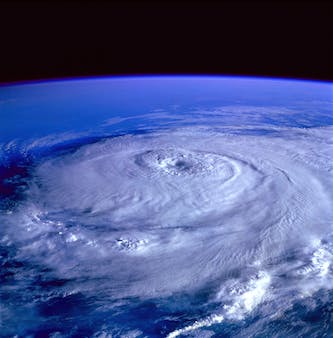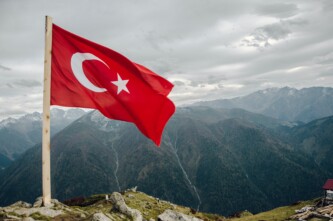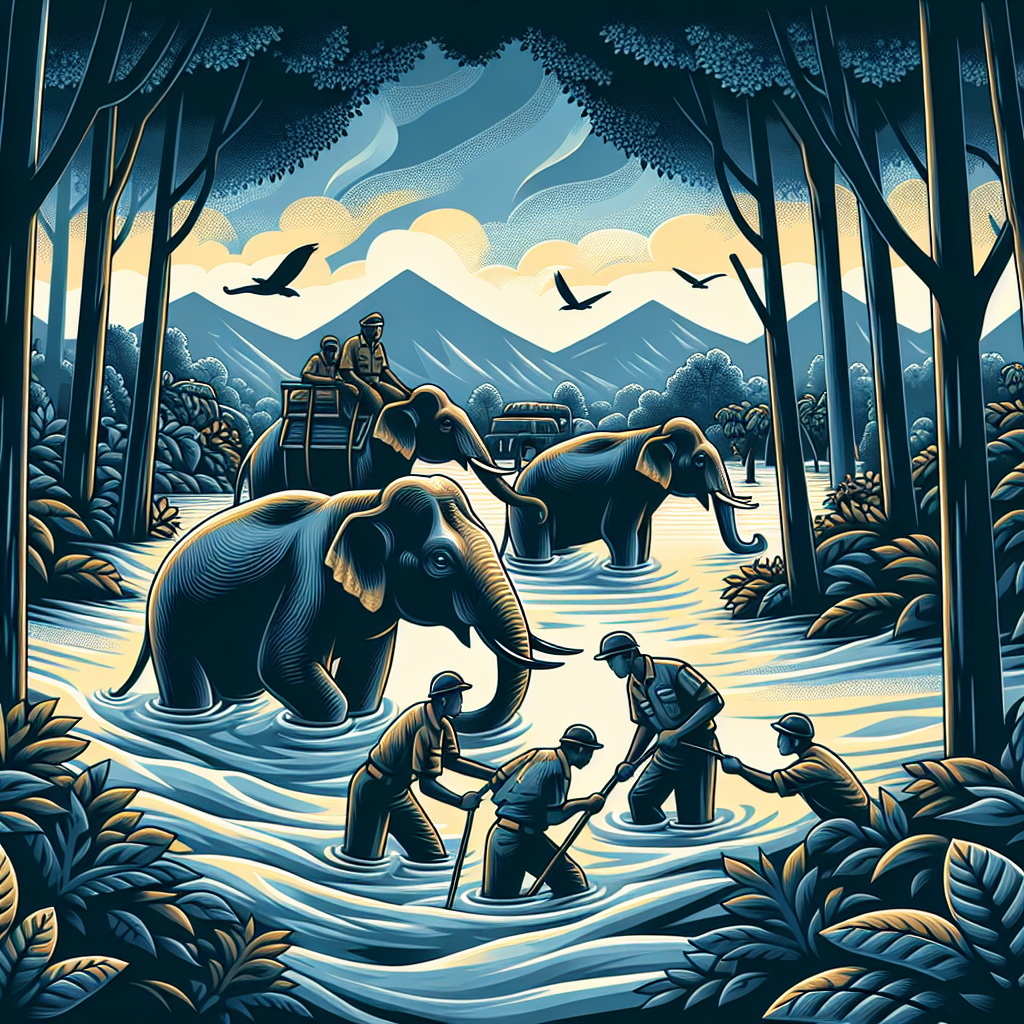Scientists made a smart computer program that can guess where hurricanes will go faster than old ways of guessing. This new program, made by a company called Google DeepMind, was right about where a storm named Hurricane Lee would hit in Canada three days before the old ways knew. Old ways of guessing the weather need to do lots of math and use big computers, but the smart program learns from what happened before to make good guesses. The smart program is not ready to take over completely, but it can help the old ways be better and faster.
The smart program did better than a famous weather guessing system from Europe in almost all tests. It made guesses really fast and didn’t need a big computer. Old ways look at the air right now to guess the weather, but the smart program uses information from the past. It knew where Hurricane Lee would go nine days before it happened, while the old way only knew six days before. But if the weather changes a lot because of climate change, the smart program might not guess as well.
Lots of companies and weather people are trying to make their own smart programs for guessing the weather. In the United Kingdom, the weather people are working with a smart place called the Turing Institute to see how the smart program can help. The smart program still needs the old ways to learn and get information. It’s not going to replace the old ways, but it can help a lot. If the weather starts doing new, crazy things more often, it might be hard for the smart program to keep up.
Original news source: AI could predict hurricane landfall sooner – report (BBC)
Listen
Slow
Normal
Fast
Group or Classroom Activities
Warm-up Activities:
– News Summary
Instructions: Students will work in pairs to summarize the article in their own words, focusing on the main points: the creation of the smart computer program by Google DeepMind, its ability to predict hurricanes, and how it compares to old methods. They should aim for a brief summary of about three sentences. Afterward, they will share their summaries with the class.
– Word Association
Instructions: Write the term “smart computer program” on the board. Ask students to call out words that they associate with this term. Write down their responses around the term, creating a web of vocabulary. Afterward, discuss how these words relate to the article and the context in which they are used.
– Sketch It
Instructions: Divide the class into small groups. Assign each group a different part of the article (e.g., the smart program’s prediction capabilities, the comparison with old methods, the collaboration with the Turing Institute). Each group will create a simple sketch that represents their assigned content. Afterward, each group will explain their sketch to the class and how it relates to the article.
– Opinion Spectrum
Instructions: Line up students on a spectrum from “strongly agree” to “strongly disagree” based on their opinion on the statement: “Smart computer programs will eventually replace traditional methods of weather prediction.” Students must explain their position on the spectrum and provide reasons for their opinion, drawing from information in the article.
– Future Predictions
Instructions: Ask students to imagine how weather prediction might change in the next 10 years because of smart computer programs. Students will write a short paragraph with their predictions and share with a partner. Encourage them to use vocabulary and ideas from the article, as well as their own creativity.
Comprehension Questions:
1. What did scientists create to guess where hurricanes will go?
2. How did the new program do compared to the old ways of guessing when Hurricane Lee would hit Canada?
3. Why is the smart program faster than the old ways of predicting the weather?
4. What is the difference between how the smart program guesses the weather and how the old ways do it?
5. What might make the smart program not guess the weather as well?
6. Who are the weather people in the United Kingdom working with to improve the smart program?
7. Can the smart program work all by itself to predict the weather?
Go to answers ⇩
Listen and Fill in the Gaps:
Scientists made a (1)______ computer program that can guess where hurricanes will go faster than old ways of guessing. This new program, made by a company called Google DeepMind, was right about where a storm (2)______ Hurricane Lee would hit in Canada three (3)______ before the old ways knew. Old ways of guessing the weather need to do lots of math and use big computers, but the smart program learns from what happened before to make good guesses. The smart program is not ready to take over completely, but it can help the old ways be better and faster.
The smart program did better than a (4)______ weather guessing system from Europe in almost all tests. It made guesses really fast and didn’t need a big (5)______. Old ways (6)______ at the air right now to guess the weather, but the smart program uses information from the past. It knew where (7)______ Lee would go nine days before it happened, while the old way only knew six days before. But if the weather changes a lot because of climate change, the smart program might not guess as well.
(8)______ of (9)______ and weather people are trying to make their own smart programs for guessing the weather. In the (10)______ Kingdom, the weather people are working with a smart place called the Turing Institute to see how the smart program can help. The smart program still needs the old ways to (11)______ and get information. It’s not going to replace the old ways, but it can help a lot. If the weather starts (12)______ new, crazy things more often, it might be hard for the smart program to keep up.
Go to answers ⇩
Discussion Questions:
Students can ask a partner these questions, or discuss them as a group.
1. What is a hurricane?
2. How would you feel if a smart computer program could tell you when a hurricane is coming?
3. Do you like the idea of using computers to guess the weather? Why or why not?
4. Do you think smart computer programs are better than old ways of guessing the weather? Why?
5. Have you ever been in a big storm? What was it like?
6. What do you do to stay safe when the weather is bad?
7. Why do you think it’s important to know about the weather in advance?
8. If you could make a smart program, what would you want it to do?
9. Do you think computers will do everything for us one day? Why or why not?
10. How do you think weather people feel about smart programs helping them?
11. Do you think smart programs should replace old ways or work together with them? Why?
12. What do you think might be a problem with smart programs if the weather changes a lot?
Individual Activities
Vocabulary Meanings:
Match each word to its meaning.
Words:
1. program
2. hurricanes
3. guesses
4. computers
5. information
6. climate change
7. companies
8. weather
Meanings:
(a) Facts or details about something
(b) What the sky is like outside, like if it’s sunny or rainy
(c) When the weather gets really different because of the Earth getting warmer
(d) Machines that can do math and store lots of information
(e) Groups of people who work together to make money
(f) Trying to figure out something without knowing for sure
(g) Big storms with lots of wind and rain
(h) A smart computer that can do things
Go to answers ⇩
Multiple Choice Questions:
1. Who made the smart computer program for guessing hurricanes?
(a) The Turing Institute
(b) The United Kingdom
(c) Google DeepMind
(d) The weather people
2. How did the smart program do compared to the old ways of guessing the weather?
(a) It did better in almost all tests
(b) It did worse in almost all tests
(c) It did the same as the old ways
(d) It only worked sometimes
3. How does the smart program make good guesses?
(a) By looking at the air right now
(b) By using a big computer
(c) By learning from what happened before
(d) By guessing randomly
4. How many days before Hurricane Lee hit in Canada did the smart program know where it would go?
(a) Three days
(b) Six days
(c) It didn’t know
(d) Nine days
5. What might make it hard for the smart program to guess the weather well?
(a) A big computer
(b) The old ways of guessing
(c) The Turing Institute
(d) Climate change
6. What are lots of companies and weather people trying to make?
(a) Their own big computers
(b) Their own smart programs for guessing the weather
(c) Their own math problems
(d) Their own hurricanes
7. Who is the Turing Institute working with to see how the smart program can help?
(a) The weather people in the United Kingdom
(b) Google DeepMind
(c) The smart program from Europe
(d) The old ways of guessing the weather
8. What does the smart program need to learn and get information?
(a) The weather people
(b) The old ways
(c) The Turing Institute
(d) The air right now
Go to answers ⇩
True or False Questions:
1. The program correctly predicted where Hurricane Lee would hit in Canada three days before the old ways did.
2. The program was made by a company called Google DeepMind.
3. Scientists created a computer program that cannot predict where hurricanes will go faster than the old ways.
4. The program ignores past events to make accurate predictions.
5. The program underperformed a famous weather prediction system from Europe in most tests.
6. The program does require a big computer and cannot make fast predictions.
7. The program uses historical information to predict the weather, while the old ways rely on current air conditions.
8. The program is not ready to completely replace the old ways, but it can help them be better and faster.
Go to answers ⇩
Write a Summary:
Write a summary of this news article in two sentences.
Check your writing now with the best free AI for English writing!
Writing Questions:
Answer the following questions. Write as much as you can for each answer.
Check your answers with our free English writing assistant!
1. What does the smart computer program do better than the old ways of guessing where hurricanes will go?
2. How many days before Hurricane Lee hit Canada did the smart program guess right?
3. Why don’t the smart programs need big computers like the old ways do?
4. What is one problem the smart program might have if the weather changes a lot?
5. Who are working together in the United Kingdom to improve the smart program?
Answers
Comprehension Question Answers:
1. What did scientists create to guess where hurricanes will go?
Scientists made a smart computer program to guess where hurricanes will go.
2. How did the new program do compared to the old ways of guessing when Hurricane Lee would hit Canada?
The new program guessed where Hurricane Lee would hit Canada three days before the old ways did.
3. Why is the smart program faster than the old ways of predicting the weather?
The smart program is faster because it learns from past events to make good guesses, instead of doing lots of math like the old ways.
4. What is the difference between how the smart program guesses the weather and how the old ways do it?
The smart program uses information from the past to guess the weather, while the old ways look at the air right now to make their guesses.
5. What might make the smart program not guess the weather as well?
If the weather changes a lot because of climate change, the smart program might not guess as well.
6. Who are the weather people in the United Kingdom working with to improve the smart program?
The weather people in the United Kingdom are working with the Turing Institute to improve the smart program.
7. Can the smart program work all by itself to predict the weather?
No, the smart program still needs the old ways to learn and get information. It can’t work all by itself.
Go back to questions ⇧
Listen and Fill in the Gaps Answers:
(1) smart
(2) named
(3) days
(4) famous
(5) computer
(6) look
(7) Hurricane
(8) Lots
(9) companies
(10) United
(11) learn
(12) doing
Go back to questions ⇧
Vocabulary Meanings Answers:
1. program
Answer: (h) A smart computer that can do things
2. hurricanes
Answer: (g) Big storms with lots of wind and rain
3. guesses
Answer: (f) Trying to figure out something without knowing for sure
4. computers
Answer: (d) Machines that can do math and store lots of information
5. information
Answer: (a) Facts or details about something
6. climate change
Answer: (c) When the weather gets really different because of the Earth getting warmer
7. companies
Answer: (e) Groups of people who work together to make money
8. weather
Answer: (b) What the sky is like outside, like if it’s sunny or rainy
Go back to questions ⇧
Multiple Choice Answers:
1. Who made the smart computer program for guessing hurricanes?
Answer: (c) Google DeepMind
2. How did the smart program do compared to the old ways of guessing the weather?
Answer: (a) It did better in almost all tests
3. How does the smart program make good guesses?
Answer: (c) By learning from what happened before
4. How many days before Hurricane Lee hit in Canada did the smart program know where it would go?
Answer: (d) Nine days
5. What might make it hard for the smart program to guess the weather well?
Answer: (d) Climate change
6. What are lots of companies and weather people trying to make?
Answer: (b) Their own smart programs for guessing the weather
7. Who is the Turing Institute working with to see how the smart program can help?
Answer: (a) The weather people in the United Kingdom
8. What does the smart program need to learn and get information?
Answer: (b) The old ways
Go back to questions ⇧
True or False Answers:
1. The program correctly predicted where Hurricane Lee would hit in Canada three days before the old ways did. (Answer: True)
2. The program was made by a company called Google DeepMind. (Answer: True)
3. Scientists created a computer program that cannot predict where hurricanes will go faster than the old ways. (Answer: False)
4. The program ignores past events to make accurate predictions. (Answer: False)
5. The program underperformed a famous weather prediction system from Europe in most tests. (Answer: False)
6. The program does require a big computer and cannot make fast predictions. (Answer: False)
7. The program uses historical information to predict the weather, while the old ways rely on current air conditions. (Answer: True)
8. The program is not ready to completely replace the old ways, but it can help them be better and faster. (Answer: True)
Go back to questions ⇧















